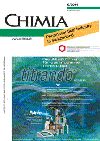
Switch-Peptides: From Conformational Studies to Alzheimer's Disease
Abstract:
Studies on designed peptides that exhibit high tendencies for medium-induced conformational transitions have recently attracted much attention because structural changes are considered as molecular key processes in degenerative diseases. The experimental access to these events has been limited so far mainly due to the intrinsic tendency of the involved polypeptides for self-association and aggregation, e.g. amyloid β plaque formation, thought to be at the origin of Alzheimer's disease. We have developed a new concept termed 'switch-peptides' which allows the controlled onset of polypeptide folding and misfolding in vitro and in vivo, starting from a soluble, non-toxic precursor molecule. As a major feature, the folding process is initiated by enzyme-triggered N,O-acyl migrations restoring the native peptide backbone in situ. As the folding is set off in the moment of creating the bioactive molecule ('in statu nascendi', ISN), our concept allows for the first time the investigation of the early steps of protein misfolding as relevant in degenerative diseases, opening new perspectives for the rational design of therapeutically relevant compounds.Keywords: DEGENERATIVE DISEASES; INDUCTION OF BIOLOGICAL FUNCTION; PROTEIN MISFOLDING; RATIONAL DRUG DESIGN; SWITCH-PEPTIDES
Document Type: Miscellaneous
DOI: http://dx.doi.org/10.2533/000942906777674921
Publication date: April 1, 2006
Tools
Access Key
Free content
New content
Open access content
Subscribed content
Free trial content